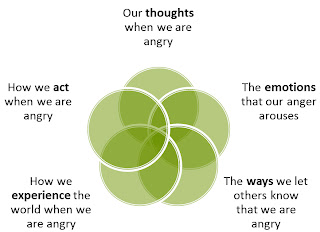Anger is a universal experience. We all get angry from time to time. All humans and animals experience the feeling of anger in different degrees, scenarios, environments and forms. The key to controlling anger is not to hide it, but to learn how to manage it. Managing anger productively is something few individuals, organizations and societies do well, yet those who find suitable strategies are much more productive and successful than those who can't seem to find the right approach.
When we look at a co-worker who can productively confront their associate about a negative attitude, we realize that this increases the team's chance of success as well as minimizes the risk of destructive conflict. The customer service agent who has the skills to defuse an angry customer will be successful in keeping loyalty and also make their day less troublesome. Organizations who have individuals working for them who can handle anger strategically will have a greater edge.
The goal of anger management should be to reduce your emotional feelings and the type of physiological stimulation that angry emotions provoke. To attempt to get rid of or avoid things or people who anger you is not realistic- but it is possible to learn to control what you do about it. Building a relationship and understanding with our emotions will allow us to manage them, rather than letting them manage us. Most of the time, our instincts will tell us to respond to anger aggressively. It is a natural way to respond when we feel threatened, and this is what inspires powerful feelings and behaviours which help us fight back when 'under attack'.
Self-awareness is a key element for managing your own anger. You must be able to identify when you are angry and what triggers are cues for when something is wrong. Expressing your anger in an assertive, but not aggresive, way is safe and healthy. In order to understand and develop the skills associated with anger management, think of anger as five interrelated dimensions which all operate simultaneously.
For example, what you think (thoughts) when you are angry influences how you feel (emotions). How you feel when you are angry influences how you communicate (ways). How you communicate affects how you think (experience), and how you think affects how you behave (act). When you put this in to your own perspective and understand how it relates to you, you will be able to work on the parts that need improving for yourself and become a better manager of your anger.
You might be asking yourself- what are my next steps for dealing with my anger and anxiety? We would tell you this: take some time to assess all of your interrelated dimensions of anger and identify where there are gaps. Which dimension do you find yourself getting stuck in more often than others? Once you are able to identify the gaps within yourself, start exploring which techniques might work best for you to try when controlling your stress in heated situations.
What have you found works best for you when controlling and maintaining your feelings of anger?


No comments:
Post a Comment